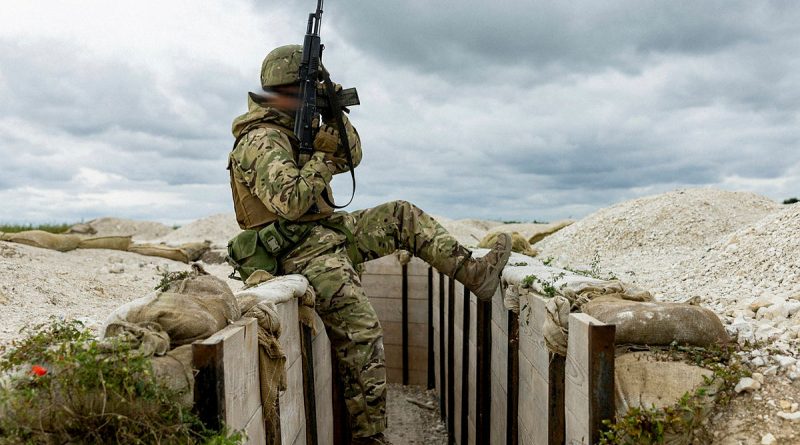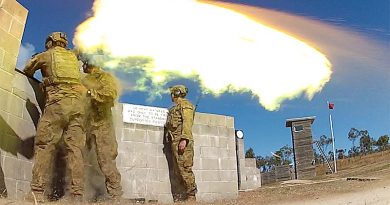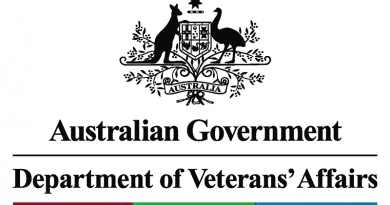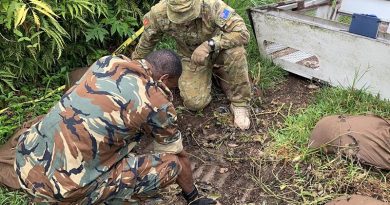Aussies witness the will to win in Ukraine

As storm clouds roll over a training area in the south of England, new recruits wind their way through the trenches. The temperature starts to drop.
CAPTION: A recruit from the Armed Forces of Ukraine on Operation Kudu in the UK. Story by Major Carrie Robards. Photos by Leading Aircraftwoman Emma Schwenke.
Calls of “grenata!” ring out as they continue to weave their way through the trench system and clear it of enemy fighters in an effort to regain the ground and maintain their initiative.
The rain starts to fall, but it will not affect the recruits from the Armed Forces of Ukraine (AFU). Their will is unwavering, their resolve is clear. For them, this is not just a fictitious training scenario for a potential adversary – they are preparing for the battlefield.
This cohort of recruits have almost finished their basic infantry course with the trainers from rotation three of the Australian Army deployment to Operation Kudu – Australia’s contribution to the UK-led multinational mission training AFU soldiers.
The course is five weeks of intense training that has the recruits living in the field, and fighting in conditions similar to what they will face in Ukraine.
The course covers a wide range of content, including field craft, patrolling, handling and maintaining a weapon, and tactical combat care.
The primarily Darwin-based Australian soldiers have passed on their skills and knowledge that will have real-world application for the recruits to fight for their freedom, an Australian Army trainer explained.
“What we do here is give them a method of soldiering, but we’re not providing them with the only way to do it. It just sets them up with the foundation skills to help them for what they are going to face when they get home,” he said.
“They are quick to pick up all the new skills and quite good at conducting their drills as well. These are the things that are going to keep them alive and win the fight in Ukraine.”
The feedback from the AFU soldiers has been positive.
“There’s a lot to learn listening to the Australian instructors,” 18-year-old Niki said.
“They explain to you what war is, how it’s run and how to react in different situations.”
A 22-year-old female recruit, who worked in Ukraine as a dental assistant before enlisting, said while it was difficult to be away from home, the training was vital.
“I want to learn from them as much as I can,” she said.
“The main point is how to survive, weapon handling, and how to survive in combat.
“We are really grateful to our Australian instructors.”
The recruits are set apart by their desire to learn, explained the Australian trainers. Even in their breaks from training, or while eating meals, they take on whatever information they can.
The recruits are highly motivated. Not only did they choose to stay in Ukraine during the invasion, they have become citizen soldiers, volunteering to leave their regular jobs to pick up arms in support of the AFU.
Many are motivated by the desire to protect their home, friends and families.
Olga is a 39-year-old teacher from Odessa, a sea port on the Black Sea in south-western Ukraine.
“We were not under occupation, and we will not be, that’s for sure,” she said.
Olga decided to join the Army as many of her students had, and her son is currently serving.
“Our victory will be soon. A lot of women have also joined the Army. It’s a desire to win. I defend my children and my house,” she said.
The sentiment is shared by 21-year-old recruit Margaret.
“I had an usual job, but I joined the Army for the Ukrainian people,” she said.
“I lost a lot of people that were close to me. I couldn’t just watch it and do nothing. I want to defend my house, my friends, my family.
“I want to be an example to my country when they say that a woman can’t cope with everything. I want to prove the opposite, that a woman can be stronger than a man. We can show that women can manage it and can cope with anything.”
As the invasion by Russia continues, many Ukrainian citizen soldiers have taken up arms in defence of their homeland.
Up until recently, these recruits worked in Ukraine in everyday roles – teachers, builders, retail assistants and business owners.
By the end of the month, more than 1000 AFU soldiers will have successfully completed the course and returned to Ukraine to join the fight.
Australian commander for the third rotation of Operation Kudu said the recruits had performed exceptionally well.
“We see their progression build throughout the basic infantry course to the point where they go from never having handled a weapon before, right through to conducting fire and movement in quite complex scenarios before they leave the training,” he said.
“It is a very different type of training with civilians that don’t have any military experience.
“The importance of the Australian contribution to Operation Kudu is multifaceted, in that if we don’t succeed there is the immediate impact on the trainee in the skill level that they exit this course with, but the other aspect is we are here as a partner nation contributing to the wider operation, which shows the international community we are behind Ukraine.”
Another Australian training troop commander said the learning had been reciprocated.
“Their [the AFU] section commanders have a lived experience of war, and so they were able to teach us a few things, especially about trench assaults,” he said.
“This has really changed my understanding of the personal and lived experience of the people suffering in the conflict.
“On talking to the recruits you get an understanding of the extent of the pain and suffering of their friends and family. It really brings home that it’s not only the recruits but a large population back in Ukraine that are suffering from this conflict.”
Aleksandr is an AFU instructor from Kharkiv, a large city that has been through intense fighting. He left his job as a builder to join the Army, after deciding to “take a stand”.
“I think this is very important,” he said.
Different countries are uniting in this and they are learning from each other.
“I say thank you. To Australia, Britain and all who are helping out our country – glory to Ukraine … it’s time to make it end.”
.
.

.
.






Dear trainers, recruits, all stakeholders. How are the reciprocal “lessons learned” from both trainers and trainees including such as weapons use, the very different “rules of engagement”, geography, morality, conduct of potential and actual adversaries, very heavy use of artillery etc. by adversaries, tactics, morale, resolve, motivation, command, rank, individual initiative relationships………………..being evaluated, documented, and disseminated more broadly across the defence establishments of both Australian and Ukrainian militaries and particularly such as ADFA, UNSW, RMC, military leadership in Australia, real time?
When Ukrainian trainees like Niki, Olga, Margaret, Aleksandr of the AFU (Armed Forces of Ukraine) with the will, resolve, eagerness to give challenges in training and actual combat “their best shots”, and show their mental strength, while learning initiative, innovation “on the run” in attack or defence, leave for Ukraine, what other qualities and values will they take with them that will have a distinctly and no less important impact e.g. Aussie humour, customs, culture e.g. “gooday mate”, military history (Gallipoli, Tobruk), value of human lives, human rights……?
Will both trainers and trainees mutually see in the training situations in the UK, that circumstances can and will occur on the battlefields where rank will be less important than mutual respect based on knowledge, skills, track record, results, responsibility, rather than just the usual mantra of some authoritarian militaries where “rank is god”, “don’t question, don’t ask, just do, just sacrifice” is the norm, and usually at great human cost to the authoritarian military?
Do the Australian military trainers have a good grasp of the doctrines (human wave frontal attacks), approaches, outcomes employed by the militaries of Russia, then Red Army (Soviet Union), from the 20th century, and now use of mercenaries to whom Geneva Rules of Warfare maybe irrelevant, as a background, to the generational background that the trainees have come from, because such knowledge provides a lot of context to what the trainees may face back on the battlefields back home in Ukraine?
High on the reciprocal learning list, have the Australian military (ADF) set up communication channels, where the AFU trainees, who are sent back to Ukraine and go into the battlefields will be able to feed back their battle experiences, via the AFU, and suggest what more to focus on, introduce, focus less on in the training conducted by ADF trainers, for a full circle continuous improvements feedback loop, real time?
Last but not least. Will the Australian military from the aspect of training hundreds, thousands of AFU trainees, acquire a quintessential taste for Ukrainian borsch (meat, vegetable, cabbage and beetroot soup – easily self preserving without going rancid at room temperatures for long periods in air tight containers and once cooked, spiced (salt, pepper, garlic) can be eaten hot or cold), with rye or sourdough bread. Ensure such fare is made available at ADF canteens and kitchens across Australia and even at ADF postings overseas, not just as a token of respect and appreciation for the AFU and Ukrainian people, but more importantly because of the digestive benefits, nutritional, energy value “in a meal”, that beetroot borsch soup and rye, sourdough bread can provide the consumer, if as they say a military moves according to the nutritional value and appetising taste of the food it consumes?